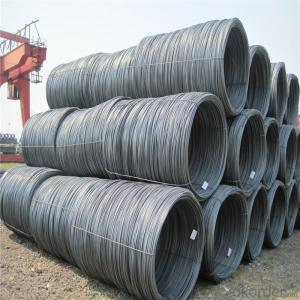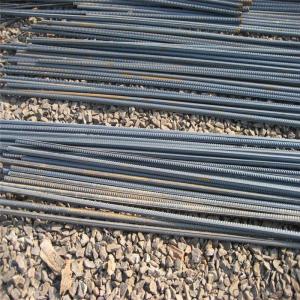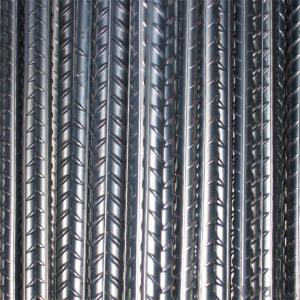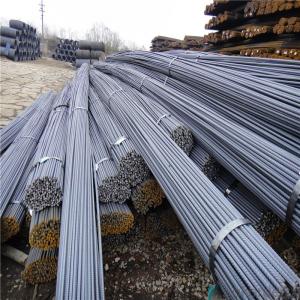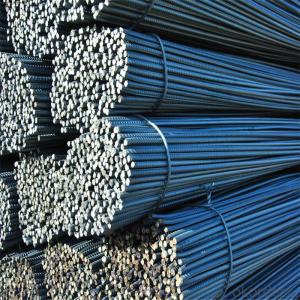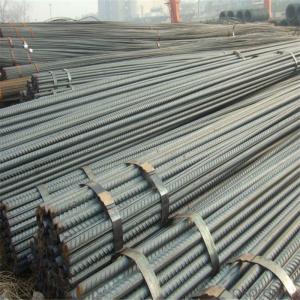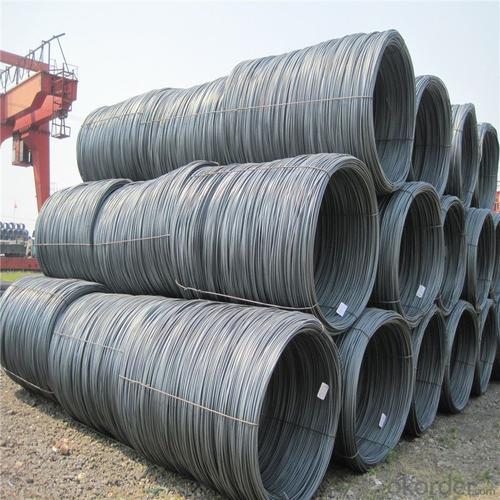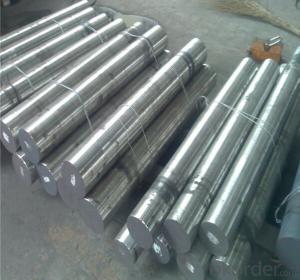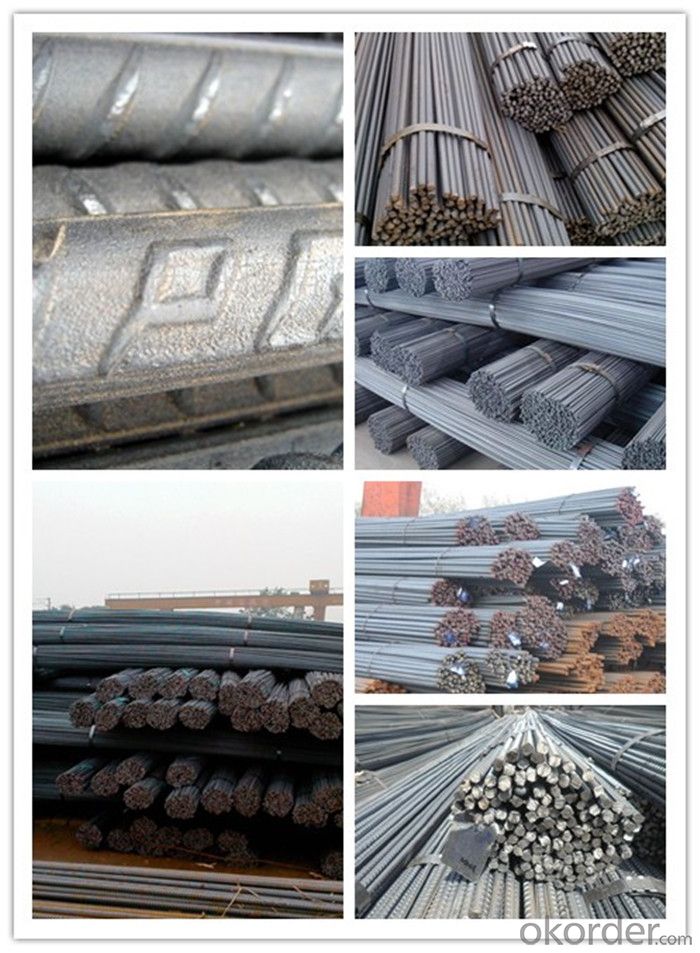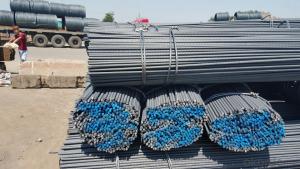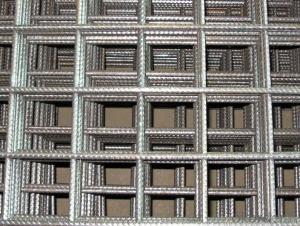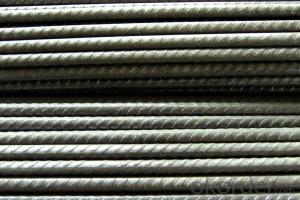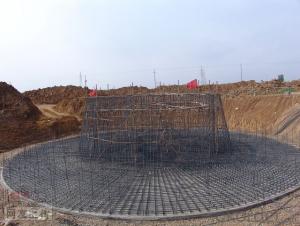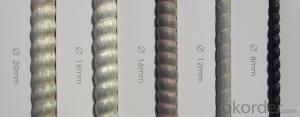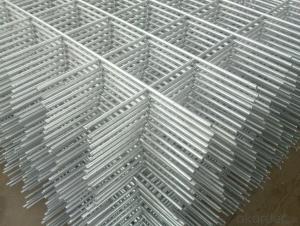Reinforcing Steel Bar Price Philippines
- Loading Port:
- Tianjin
- Payment Terms:
- TT OR LC
- Min Order Qty:
- 100 m.t.
- Supply Capability:
- 50000 m.t./month
OKorder Service Pledge
OKorder Financial Service
You Might Also Like
Specification
Reinforcing Steel Bar Price Philippines
Description of Reinforcing Steel Bar Price:
1, Diameter: 5.5mm-10mm rounds reinforcing steel bar
10m- 40mm Reinforcing Steel Bar Price
2, Length: 6m, 9m, 12m or customized
3, Standard: GB, ASTM, AISI, SAE, DIN, JIS, EN
OEM technology - send detailed technical parameters for accurate quotation.
2, Produce Process: smelt iron - EAF smelt billet - ESR smelt billet -
hot rolled or forged to get the steel round bar and plate
3, Heat Treatment: annealing, normalizing, tempering, quenching
4, Surface Treatment: Black
5, Quality Assurance: We accept third party inspection for all orders.
You can ask testing organizations such as SGS, BV, etc. to test our products before shipping.
Chemical Composition of Reinforcing Steel Bar Price:
Grade | Technical data of the original chemical composition(%) | |||||
Reinforcing steel bar HRB335 | C | Mn | Si | S | P | B |
≤0.25 | ≤1.60 | ≤0.80 | ≤0.045 | ≤0.045 | >0.0008 | |
Physics Capability | ||||||
Yield Strength(N/cm2) | Tensile Strength(N/cm2) | Elongation(%) | ||||
≥ 335 | ≥490 | ≥16 | ||||
Reinforcing steel bar HRB400 | C | Mn | Si | S | P | B |
≤0.25 | ≤0.16 | ≤0.80 | ≤0.045 | ≤0.045 | 0.04-0.12 | |
Physics Capability | ||||||
Yield Strength(N/cm2) | Tensile Strength(N/cm2) | Elongation(%) | ||||
≥ 400 | ≥ 570 | ≥ 14 | ||||
Product Show of Reinforcing Steel Bar Price:
Company Information:
CNBM International Corporation is the most important trading platform of CNBM group.
Whith its advantages, CNBM International are mainly concentrate on Cement, Glass, Iron and Steel, Ceramics industries and devotes herself for supplying high qulity series of refractories as well as technical consultancies and logistics solutions.

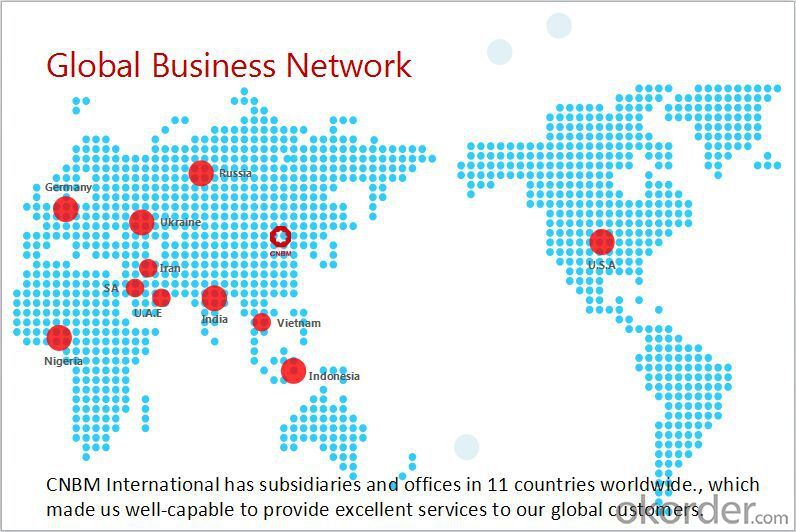
FAQ:
1, Your advantages?
professional products inquiry, products knowledge train (for agents), smooth goods delivery, excellent customer solution proposale
2, Test & Certificate?
SGS test is available, customer inspection before shipping is welcome, third party inspection is no problem
3, Factory or Trading Company?
CNBM is a trading company but we have so many protocol factories and CNBM works as a trading department of these factories. Also CNBM is the holding company of many factories.
4, Payment Terms?
30% TT as deposit and 70% before delivery.
Irrevocable L/C at sight.
5, Trading Terms?
EXW, FOB, CIF, FFR, CNF
6, After-sale Service?
CNBM provides the services and support you need for every step of our cooperation. We're the business partner you can trust.
For any problem, please kindly contact us at any your convenient time.
We'll reply you in our first priority within 24 hours.
- Q: How is special steel used in the mining industry?
- Special steel is used in the mining industry for various applications such as drilling tools, conveyor systems, crushing equipment, and structural components. Its high strength, toughness, and resistance to wear and corrosion make it ideal for withstanding the harsh conditions and heavy loads commonly encountered in mining operations. Additionally, special steel is used for creating cutting edges and teeth on mining machinery, enhancing their efficiency and durability.
- Q: How does special steel contribute to the construction machinery industry?
- High-strength and durable components are essential in the construction machinery industry, and special steel plays a crucial role in providing these. It is able to withstand extreme stress and load-bearing requirements, which is particularly important considering the heavy-duty applications of construction machinery. Special steel's excellent mechanical properties allow it to resist severe conditions, such as heavy loads, vibrations, and impacts, ensuring the safety and reliability of the equipment. Special steel is also widely used in critical components of construction machinery, including booms, buckets, tracks, and gears. These components face intense wear and tear due to constant use in harsh environments. However, special steel, engineered with enhanced hardness and wear resistance, helps prolong the lifespan of these components, reducing maintenance costs and downtime. In addition to its durability, special steel provides superior corrosion resistance, a crucial feature for construction machinery used in humid or corrosive environments. By preventing rust and decay, special steel helps maintain the equipment's performance and longevity, ultimately increasing productivity and efficiency in construction projects. Furthermore, special steel allows the construction machinery industry to achieve innovative designs and advanced functionalities. Its versatility allows for the creation of complex shapes and precise tolerances, which are necessary for optimizing machinery performance and efficiency. Special steel also enables the incorporation of advanced technologies, like sensors and automation, enhancing the accuracy and productivity of construction equipment. To summarize, special steel significantly contributes to the construction machinery industry by withstanding extreme conditions, providing superior wear resistance and corrosion protection, and enabling innovative designs. By utilizing special steel in the manufacturing process, construction machinery manufacturers can ensure the durability, safety, and efficiency of their equipment, ultimately benefiting the construction industry as a whole.
- Q: How does special steel perform in high-temperature environments?
- Special steel performs well in high-temperature environments due to its unique composition and properties. It exhibits excellent strength, resistance to corrosion, and high thermal stability, allowing it to maintain its integrity and structural performance even at elevated temperatures. This makes special steel a reliable and durable choice for applications that require withstanding extreme heat, such as in the aerospace, power generation, and automotive industries.
- Q: What are the factors that can affect the machinability of special steel?
- Special steel's machinability can be impacted by various factors. The composition of the steel is one of the main factors. The presence of specific elements like carbon, chromium, and nickel can significantly influence machinability. For instance, higher carbon content can lead to increased hardness and brittleness, making machining more challenging. Conversely, the addition of elements like sulfur and lead can enhance machinability by promoting chip formation and reducing friction. Machinability is also affected by the heat treatment of the steel. Different heat treatments, such as annealing or quenching, can modify the steel's microstructure, impacting its hardness and toughness. Heat-treated steels may be more difficult to machine due to their increased hardness or the presence of residual stresses. Mechanical properties of special steel, including hardness and tensile strength, also have an impact on machinability. Harder steels require greater cutting force, which can result in increased tool wear or vibration during machining. Similarly, steels with high tensile strength can pose challenges in terms of chip formation and tool life. Furthermore, machinability is influenced by the cutting conditions and machining parameters used. Factors such as cutting speed, feed rate, and depth of cut can have a significant impact on the process. High cutting speeds can lead to elevated temperatures and tool wear, while low cutting speeds may result in poor surface finish. Additionally, the choice of cutting tools, their geometry, and their coatings can also affect the machinability of special steel. Lastly, the presence of impurities or contaminants in the steel, such as non-metallic inclusions or surface defects, can have a negative impact on machinability. These impurities can cause tool wear, poor surface finish, or even tool breakage. Therefore, ensuring the quality and cleanliness of the steel is crucial for achieving good machinability. In conclusion, factors such as composition, heat treatment, mechanical properties, cutting conditions, and the presence of impurities can affect the machinability of special steel. Understanding and optimizing these factors can help improve machinability and enhance the overall performance of special steel during machining operations.
- Q: How does maraging steel achieve high strength through aging?
- Maraging steel achieves high strength through a process called aging, which involves heating the steel at a specific temperature for a specific duration. During aging, the alloying elements in maraging steel precipitate into fine particles, creating a strengthening effect. This process enhances the steel's hardness, tensile strength, and resistance to deformation, resulting in its high strength properties.
- Q: What are the different heat treatment processes used in special steel?
- There are several heat treatment processes used in special steel, including annealing, normalizing, quenching, tempering, and precipitation hardening. Annealing involves heating the steel to a high temperature and then slowly cooling it, which helps to relieve internal stresses and improve its ductility. Normalizing is similar to annealing, but the cooling process is done in still air, resulting in a more uniform grain structure. Quenching involves rapidly cooling the steel in a liquid, such as water or oil, to achieve high hardness and strength. Tempering is a process that follows quenching, where the steel is reheated to a specific temperature and then cooled, which reduces the brittleness and improves toughness. Lastly, precipitation hardening involves heating the steel to a high temperature and then cooling it quickly to form fine precipitates that enhance its strength.
- Q: Can special steel be used in the renewable energy sector?
- Yes, special steel can be used in the renewable energy sector. Special steel, also known as alloy steel, offers enhanced properties such as high strength, durability, and corrosion resistance, making it suitable for various applications in renewable energy technologies. In wind energy, special steel is utilized for manufacturing wind turbine components. Wind turbine towers require strong and lightweight materials to withstand the dynamic loads and harsh environmental conditions. Special steel alloys, such as high-strength low-alloy (HSLA) steel, provide the necessary strength-to-weight ratio, ensuring the structural integrity of wind turbine towers. Solar energy systems also benefit from special steel. Concentrated solar power (CSP) plants utilize mirrors or lenses to focus sunlight, generating intense heat for electricity generation. Special steel alloys with high thermal conductivity and resistance to high temperatures are used in the construction of these components, ensuring efficient energy capture and durability. Moreover, special steel is employed in the manufacturing of hydroelectric power generation equipment. Turbine components, such as blades, shafts, and runners, require materials with high strength and resistance to erosion and cavitation. Special steel alloys, such as stainless steel and tool steel, possess these characteristics, ensuring the longevity and reliability of hydroelectric power systems. In summary, special steel finds numerous applications in the renewable energy sector. Its properties, including high strength, durability, and corrosion resistance, make it suitable for wind energy, solar energy, and hydroelectric power generation. By using special steel, the renewable energy sector can enhance the performance, efficiency, and lifespan of various renewable energy technologies.
- Q: What are the different methods for improving the toughness of special steel?
- There are several methods for improving the toughness of special steel. One method is through heat treatment, which involves processes such as quenching and tempering to enhance the steel's microstructure and increase its toughness. Another method is alloying, where specific elements are added to the steel composition to improve its toughness properties. Additionally, techniques like grain refinement and controlled rolling can also be employed to enhance the toughness of special steel.
- Q: What are the challenges in machining special steel with high hardness?
- One of the major challenges in machining special steel with high hardness is the excessive tool wear. High hardness steel tends to be abrasive and causes rapid tool degradation, leading to frequent tool changes and increased production costs. Additionally, the high hardness makes it difficult to achieve precise cuts and maintain tight tolerances, affecting the overall quality of the machined parts. Another challenge is the generation of high cutting forces, which can strain the machine and potentially cause vibrations or distortions in the workpiece. Therefore, machining special steel with high hardness requires specialized tooling, advanced cutting strategies, and careful monitoring to overcome these challenges and achieve satisfactory results.
- Q: Are there any disadvantages of using special steel?
- Yes, there are some disadvantages of using special steel. Firstly, special steel is generally more expensive than regular steel. The production process of special steel involves additional alloying elements and heat treatments, which contribute to the higher cost. This can make it less economical for certain applications where cost is a major consideration. Secondly, special steel may have limited availability compared to regular steel. Special steel grades are often produced in smaller quantities and may only be available from specific suppliers. This can lead to longer lead times and difficulties in sourcing the required quantity of special steel, especially for large-scale projects. Additionally, the increased complexity of special steel can make it more difficult to work with. Special steel may require specialized knowledge, skill, and equipment to handle and process. This can lead to higher manufacturing costs and potential production delays if the necessary expertise or resources are not readily available. Furthermore, the high strength and hardness of some special steel grades can make them more prone to brittleness. This means that special steel may be more susceptible to cracking or breaking under certain conditions, especially when subjected to extreme temperatures or sudden impact loads. This can be a drawback in applications that require high toughness or resistance to fracture. Lastly, special steel may have limited applications due to its specific properties. While it offers enhanced characteristics such as corrosion resistance, high temperature resistance, or improved mechanical properties, these advantages may not be relevant or necessary for every application. In such cases, using special steel may be an unnecessary expense without any tangible benefits. In conclusion, special steel has its drawbacks, including higher costs, limited availability, increased complexity, potential brittleness, and limited applicability. Therefore, careful consideration should be given to the specific requirements of the project before opting for special steel.
Send your message to us
Reinforcing Steel Bar Price Philippines
- Loading Port:
- Tianjin
- Payment Terms:
- TT OR LC
- Min Order Qty:
- 100 m.t.
- Supply Capability:
- 50000 m.t./month
OKorder Service Pledge
OKorder Financial Service
Similar products
Hot products
Hot Searches
Related keywords
